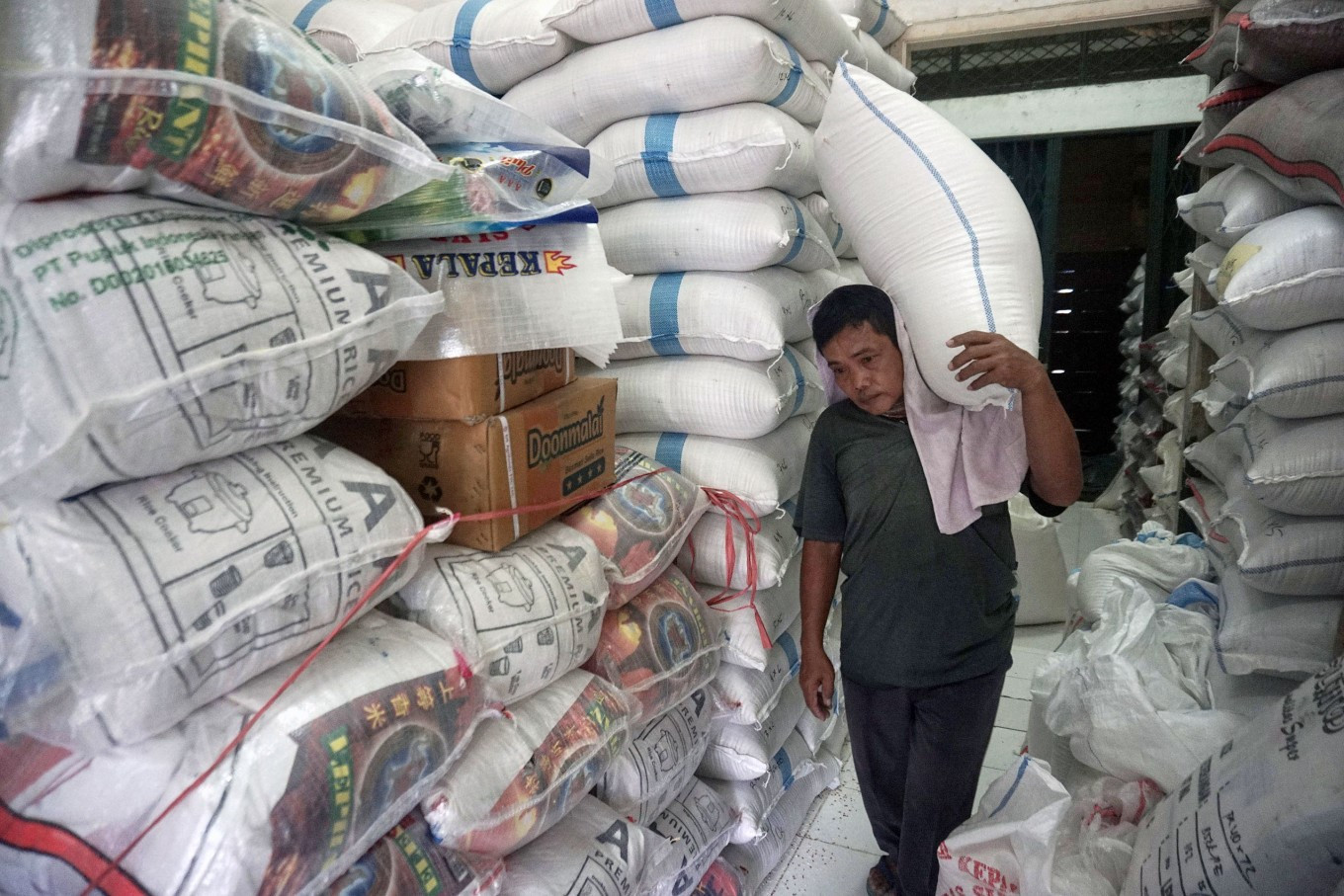Popular Reads
Top Results
Can't find what you're looking for?
View all search resultsPopular Reads
Top Results
Can't find what you're looking for?
View all search resultsLogistics pose challenge to rice imports
State Logistics Agency (Bulog), the government institution tasked with securing national staple food stocks, may face greater logistics challenges the longer the agency put off plans to seal the deal on import agreements with rice exporters.
Change text size
Gift Premium Articles
to Anyone
T
he State Logistics Agency (Bulog), the government institution tasked with securing national staple food stocks, may face greater logistics challenges the longer the agency puts off plans to seal the deal on import agreements with rice exporters.
Bayu Krisnamurthi, the advisory board member of the Association of Agriculture Experts (Perhepi), said several technical aspects must be fulfilled to import rice, including the volume and timing of implementation.
“Scheduling [the imports] is the most crucial aspect because it is related to transportation, including the loading and unloading process and the time it takes [for the rice] to arrive at the port,” he told The Jakarta Post on Tuesday. “Looking for a carrier at the end of this year when logistics disruptions have not fully abated can be challenging.”
He went on to say that 500,000 tonnes of rice is a large amount to be transported by ship, which usually have a capacity of 5,000 to 10,000 tonnes. Thus, the delivery needs to be scheduled based on the volume transported per shipment.
Bulog rice reserves currently amount to only 503,000 tonnes, according to the agency’s public relations head Tomi Wijaya. This amount is a far cry from the 1.2 million tonnes target by year-end.
“Considering the current global food crisis, imports are not as easy as usual,” Tomi told the Post on Tuesday when asked for confirmation regarding the possibility of getting imported rice to arrive in Indonesia in mid-December.
Perhepi’s Bayu cautioned that Bulog’s very low rice reserves might diminish the agency’s ability to influence market psychology to maintain domestic price stability and to control inflation.
Previously, Bulog president director Budi Waseso told House of Representatives Commission IV overseeing agriculture, fisheries and food production during a hearing on Nov. 23 that Bulog was waiting for the domestic procurement realization reports from the Agriculture Ministry before importing rice.
Permission for Bulog to import 500,000 tonnes of rice had been given in a recent limited coordination meeting (Rakortas) involving relevant ministries. The move will mark Indonesia’s first import since the state procurement agency entered the international rice market for a significant volume in 2018.
“Despite having the 500,000 tonnes of the import quota, we will still prioritize domestic production even though the price is high,” Budi told reporters after the hearing on Nov. 23.
Medium-grade rice prices increased to Rp 9,200 (59 US cents) per kilogram in Jakarta’s Cipinang Central Rice Market at the end of November, up from a range of Rp 8,300 to Rp 8,500 in August.
According to the National Food Agency (NFA), rising rice prices over the past three months contributed 3 to 4 percent to national inflation.
Read also: Analysis: Rice stocks deplete, govt ministries split over plan to import rice
Prepare for crisis
At a cabinet meeting on Wednesday, meanwhile, President Joko “Jokowi” Widodo underlined the urgent need for Indonesia to secure national rice reserves for 2023 amid ongoing risk of food crisis.
“We have to be aware of the food crisis risk since it may trigger social and political unrest. Therefore, anything regarding domestic rice reserves must be calculated carefully and precisely. Do not make a mistake,” he noted.
The President also urged the authorities to make sure the domestic rice procurement be fulfilled on time so that whenever Bulog’s reserves run low, the speculators would not intervene and trigger food price hike.
On the other hand, NFA head Arief Prasetyo Adi on Tuesday confirmed that the agency had secured around 200,000 tonnes of rice abroad to be distributed, only when necessary. The procured rice would not be released to the domestic market and would only be used for several purposes, including disaster management and price intervention.
“The use [of the imported rice] will be monitored closely to ensure that it won’t seep into the [domestic] market,” he said after a plenary Cabinet meeting in Jakarta on Tuesday.
Arief went on to say that the government’s rice reserves needed to be replenished to stabilize rice prices and anticipate emergency conditions. “The national rice production is in good condition. What we want to [increase] is Bulog rice reserves.”
Aside from its importing activities, Bulog will procure an additional 500,000 tonnes of rice from local farmers to bolster stocks and ensure stable domestic rice prices.
Despite Bulog's recent import activities, the Food and Agricultural Organization (FAO) forecast Indonesian 2022 rice output at 55.7 million tonnes in October, up by 2.3 percent year-on-year (yoy) “due to area expansions and favorable yield prospects.”
No major yoy bump to domestic rice prices was recorded by the FAO.










